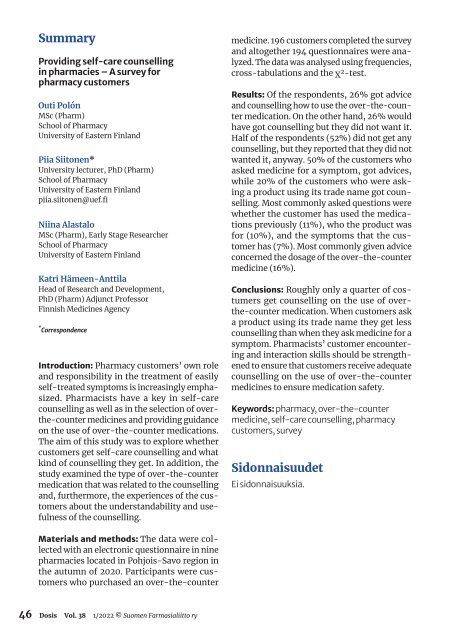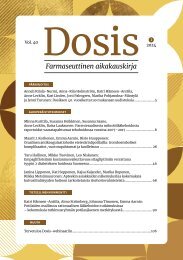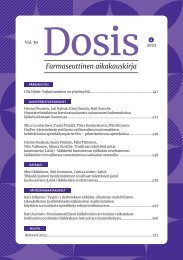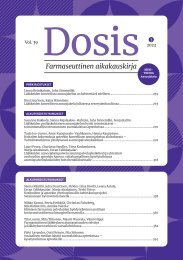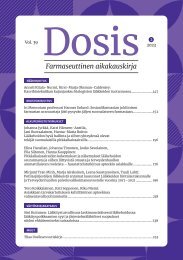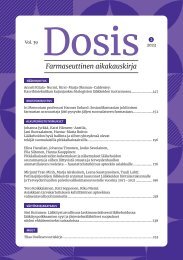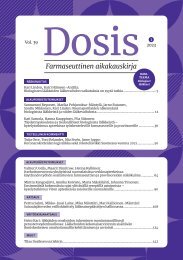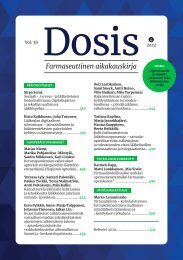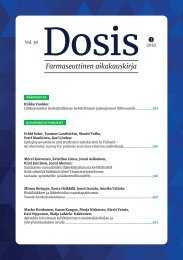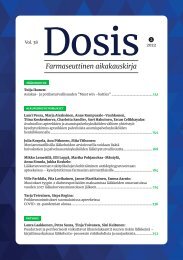DOSIS 1/2022
Farmaseuttinen aikakauskirja DOSIS 4/2021 vol.37 5uomen Farmasialiitto ry
Farmaseuttinen aikakauskirja DOSIS 4/2021 vol.37 5uomen Farmasialiitto ry
You also want an ePaper? Increase the reach of your titles
YUMPU automatically turns print PDFs into web optimized ePapers that Google loves.
Summary<br />
Providing self-care counselling<br />
in pharmacies – A survey for<br />
pharmacy customers<br />
Outi Polón<br />
MSc (Pharm)<br />
School of Pharmacy<br />
University of Eastern Finland<br />
Piia Siitonen*<br />
University lecturer, PhD (Pharm)<br />
School of Pharmacy<br />
University of Eastern Finland<br />
piia.siitonen@uef.fi<br />
Niina Alastalo<br />
MSc (Pharm), Early Stage Researcher<br />
School of Pharmacy<br />
University of Eastern Finland<br />
Katri Hämeen-Anttila<br />
Head of Research and Development,<br />
PhD (Pharm) Adjunct Professor<br />
Finnish Medicines Agency<br />
* Correspondence<br />
Introduction: Pharmacy customers’ own role<br />
and responsibility in the treatment of easily<br />
self-treated symptoms is increasingly emphasized.<br />
Pharmacists have a key in self-care<br />
counselling as well as in the selection of overthe-counter<br />
medicines and providing guidance<br />
on the use of over-the-counter medications.<br />
The aim of this study was to explore whether<br />
customers get self-care counselling and what<br />
kind of counselling they get. In addition, the<br />
study examined the type of over-the-counter<br />
medication that was related to the counselling<br />
and, furthermore, the experiences of the customers<br />
about the understandability and usefulness<br />
of the counselling.<br />
medicine. 196 customers completed the survey<br />
and altogether 194 questionnaires were analyzed.<br />
The data was analysed using frequencies,<br />
cross-tabulations and the X 2 -test.<br />
Results: Of the respondents, 26% got advice<br />
and counselling how to use the over-the-counter<br />
medication. On the other hand, 26% would<br />
have got counselling but they did not want it.<br />
Half of the respondents (52%) did not get any<br />
counselling, but they reported that they did not<br />
wanted it, anyway. 50% of the customers who<br />
asked medicine for a symptom, got advices,<br />
while 20% of the customers who were asking<br />
a product using its trade name got counselling.<br />
Most commonly asked questions were<br />
whether the customer has used the medications<br />
previously (11%), who the product was<br />
for (10%), and the symptoms that the customer<br />
has (7%). Most commonly given advice<br />
concerned the dosage of the over-the-counter<br />
medicine (16%).<br />
Conclusions: Roughly only a quarter of costumers<br />
get counselling on the use of overthe-counter<br />
medication. When customers ask<br />
a product using its trade name they get less<br />
counselling than when they ask medicine for a<br />
symptom. Pharmacists’ customer encountering<br />
and interaction skills should be strengthened<br />
to ensure that customers receive adequate<br />
counselling on the use of over-the-counter<br />
medicines to ensure medication safety.<br />
Keywords: pharmacy, over-the-counter<br />
medicine, self-care counselling, pharmacy<br />
customers, survey<br />
Sidonnaisuudet<br />
Ei sidonnaisuuksia.<br />
Materials and methods: The data were collected<br />
with an electronic questionnaire in nine<br />
pharmacies located in Pohjois-Savo region in<br />
the autumn of 2020. Participants were customers<br />
who purchased an over-the-counter<br />
46 Dosis Vol. 38 1/<strong>2022</strong> © Suomen Farmasialiitto ry


